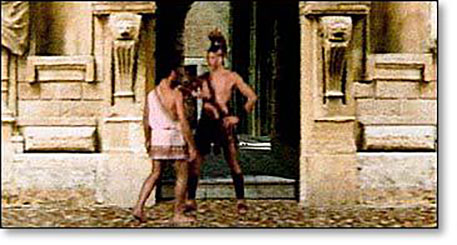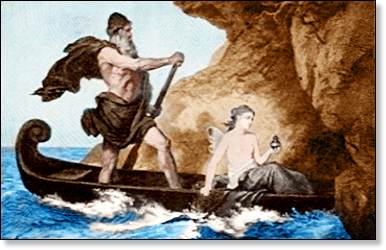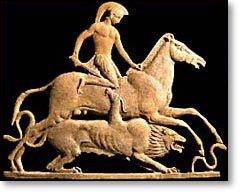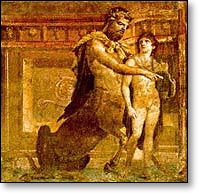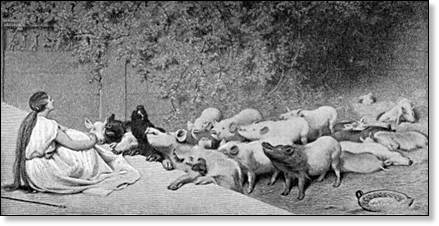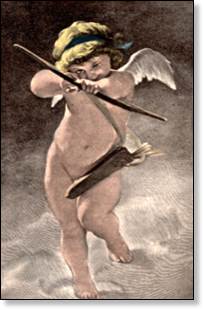Crete (kreet or KREE-tee). Large Aegean island; site of the Bronze Age high culture known as Minoan. In myth Crete was ruled by King Minos, who periodically demanded a tribute of young men and maidens of Athens to be sacrificed to the Minotaur, the monster of the Labyrinth.
 Crete was the site of the earliest high civilization in Europe. For two thousand years there flourished a culture called Minoan, after King Minos. This civilization was characterized by unique artwork and architecture, notably the imposing complex of buildings at Knossos. The layout of Knossos was so complicated that it would have been incomprehensible to visitors, contributing to the myth of the Labyrinth.
Crete was the site of the earliest high civilization in Europe. For two thousand years there flourished a culture called Minoan, after King Minos. This civilization was characterized by unique artwork and architecture, notably the imposing complex of buildings at Knossos. The layout of Knossos was so complicated that it would have been incomprehensible to visitors, contributing to the myth of the Labyrinth.
 Guides at Knossos today escort visitors to gaze in awe at the "throne of King Minos", but such ceremonial seats as have been restored more likely served a presiding religious official than a king. The "palace" itself may have been a religious center. And since the deity worshipped was female, the throne was as likely to have served for a priestess as a priest or king.
Guides at Knossos today escort visitors to gaze in awe at the "throne of King Minos", but such ceremonial seats as have been restored more likely served a presiding religious official than a king. The "palace" itself may have been a religious center. And since the deity worshipped was female, the throne was as likely to have served for a priestess as a priest or king.
 The abrupt end of the high Minoan civilization has always been a great mystery. It is now believed that the eruption of the nearby volcanic island of Thera, with its shock wave, clouds of ash and tidal waves, weakened the civilization so much that mainlanders were able to take over rule of Crete. Indeed, when Krakatoa, a volcano in the South China Sea, erupted in 1883 the sonic reverberations traveled three times around the world, and the sky in New Haven, Connecticut, glowed so strangely that the fire department was called out. Ash was ejected almost twenty miles into the air, and day was turned to night for almost three hundred miles around. It has been estimated that the magma chamber of the Thera volcano was five times as large as that of Krakatoa.
The abrupt end of the high Minoan civilization has always been a great mystery. It is now believed that the eruption of the nearby volcanic island of Thera, with its shock wave, clouds of ash and tidal waves, weakened the civilization so much that mainlanders were able to take over rule of Crete. Indeed, when Krakatoa, a volcano in the South China Sea, erupted in 1883 the sonic reverberations traveled three times around the world, and the sky in New Haven, Connecticut, glowed so strangely that the fire department was called out. Ash was ejected almost twenty miles into the air, and day was turned to night for almost three hundred miles around. It has been estimated that the magma chamber of the Thera volcano was five times as large as that of Krakatoa.
 Thera is today called Santorini. Its steep cliffs are remnants of the volcano's rim, and the harbor is actually its flooded interior. The eruption left the volcano hollow inside, and when it collapsed some time later the waters of the Aegean rushed into the cavity. Rebounding when they hit bottom, they caused a tsunami or tidal wave. A tsunami caused by an earthquake in Chile in 1960 was still thirty-five feet high when it reached Hawaii. It is estimated that the Santorini tidal wave started at a comparable height and was still twenty-two feet tall when it reached the shore of what is today Israel. This would have destroyed the low-lying coastal settlements of Crete. Folk memories of this event may underlie the legend of the lost island-continent of Atlantis.
Thera is today called Santorini. Its steep cliffs are remnants of the volcano's rim, and the harbor is actually its flooded interior. The eruption left the volcano hollow inside, and when it collapsed some time later the waters of the Aegean rushed into the cavity. Rebounding when they hit bottom, they caused a tsunami or tidal wave. A tsunami caused by an earthquake in Chile in 1960 was still thirty-five feet high when it reached Hawaii. It is estimated that the Santorini tidal wave started at a comparable height and was still twenty-two feet tall when it reached the shore of what is today Israel. This would have destroyed the low-lying coastal settlements of Crete. Folk memories of this event may underlie the legend of the lost island-continent of Atlantis.
 The palace of Knossos burned down a number of times. Open flames, resinous wood and a plenitude of oil storage jars make for a volatile combination in earthquake country. The final conflagration, however, was caused neither by an earthquake nor the volcanic eruption of a neighboring isle. Though its source remains a mystery, it left a profound impression on the people of Knossos. The site was abandoned, as if haunted.
The palace of Knossos burned down a number of times. Open flames, resinous wood and a plenitude of oil storage jars make for a volatile combination in earthquake country. The final conflagration, however, was caused neither by an earthquake nor the volcanic eruption of a neighboring isle. Though its source remains a mystery, it left a profound impression on the people of Knossos. The site was abandoned, as if haunted.
|
| Croesus (KREE-sus). Historical king of proverbial riches. His ancient realm lies within present-day Turkey. Croesus derived his wealth from gold deposits in the river Pactolus, said to have been left there when another king, a mythological one, washed away the Midas touch.
|
| | Cronus (KROH-nus). Titan father of Zeus, who usurped him as ruler of the cosmos. This overthrow so enraged the Giants, who like the Titans were sons of the goddess Earth, that they attacked Mount Olympus and almost defeated Zeus and the other Olympians.
| |
| | |

